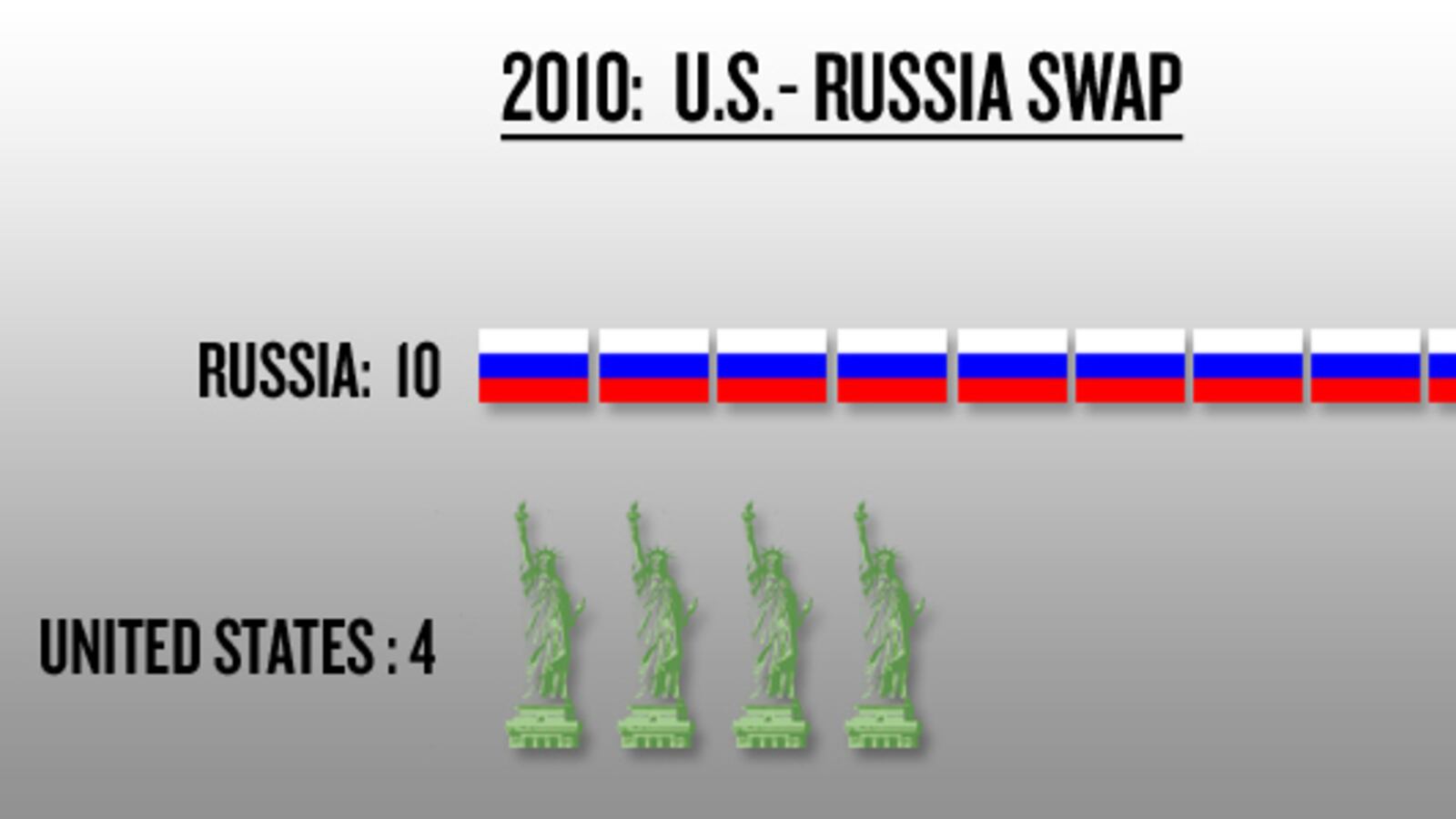
Russia: 10
United States: 4
In one of the biggest exchanges of international prisoners in over two decades—and after a quick episode had threatened to reignite old problems between Russian and American officials—the two countries traded prisoners at Vienna's international airport in July. The agreement became official when the 10 Russian sleeper agents had pleaded guilty to conspiracy before a federal judge in Manhattan, then were sentenced to time served and ordered deported. Just hours after the court hearing, the Kremlin announced that President Dmitri A. Medvedev had pardoned the four men Russia considered spies—after, of course, each of them signed statements admitting guilt. A lawyer for Aleksandr Zaporozhsky, one of four prisoners freed by the Russian government,
called it "a historic moment."

Al-Qaeda: 4
France: 1
In February, al-Qaeda's North African wing released French hostage Pierre Camatte, who had been kidnapped and held in Mali for four months. This followed Mali's release of four Islamist prisoners. Algeria and Mauritania, where other major al-Qaeda cells operate, protested Camatte's release. It appeared neither Camatte or the prisoners were spies.

Israel: 2
Hezbollah: 5 (plus 199 Lebanese and Palestinians killed over the years)
In July 2008, Israel and the Lebanese Shi'ite militant group Hezbollah carried out a prisoner exchange in which five Lebanese prisoners—including Samir Kantar, who was convicted and sentenced to life in prison for a 1979 terrorist attack—were traded for the bodies of two Israeli soldiers, Ehud Goldwasser and Eldad Regev. The remains of Goldwasser and Regev were brought to the Israeli border in plain black coffins. Israel also released 199 Lebanese and Palestinians killed in fighting over the years. "I think the [Israeli] government made a big mistake," Nina Keren, the mother of a man killed by Kantar,
told Voice of America.

Poland: 4
United States: 23
On June 12, 1985, a Polish intelligence officer arrested in 1981 and convicted of spying on the United States and three other agents—identified by the U.S. only as "persons of interest"—were swapped at the Glienicke Bridge in Berlin. The exchange was for a team of 23 American agents held in Eastern Europe.
According to the Christian Science Monitor, this may have been the continent's largest spy exchange ever.

U.S.S.R.: 2
United States: 5
In 1979, five political and religious dissidents—including Alexander Ginzburg, one of the best-known Russian dissidents ever—were released from Soviet prisons and flown to New York. The exchange: two Russians, Valdik Enger and Rudolf Chernyayev, employees of the United Nations who were convicted of espionage in the United States. ("It's a classic spy case," an FBI man told Time magazine the week after Enger and Chernyayev were
arrested at a shopping center in New Jersey.)

U.S.S.R.: 5
England: 1
In October 1969, the Soviet Politburo and the British cabinet, following years of negotiations, agreed to conduct a small swap. Peter and Helen Kroger, two senior Soviet spies who had enabled the Soviet government's nuclear program, were exchanged for Gerald Brooke, a British student who had been arrested—then jailed for five years—after importing anti-Soviet literature. The U.S.S.R. also threw in three Soviet citizens who wanted to marry Brits. Owen Matthews, the son of Lyudmila Bibikova—one of those citizens—
wrote of the swap's logistics in Newsweek: "Because the exchange was so unequal (two top spies for a student!), the Soviet government agreed to throw in three Soviet citizens who wanted to marry Brits as a bonus."





